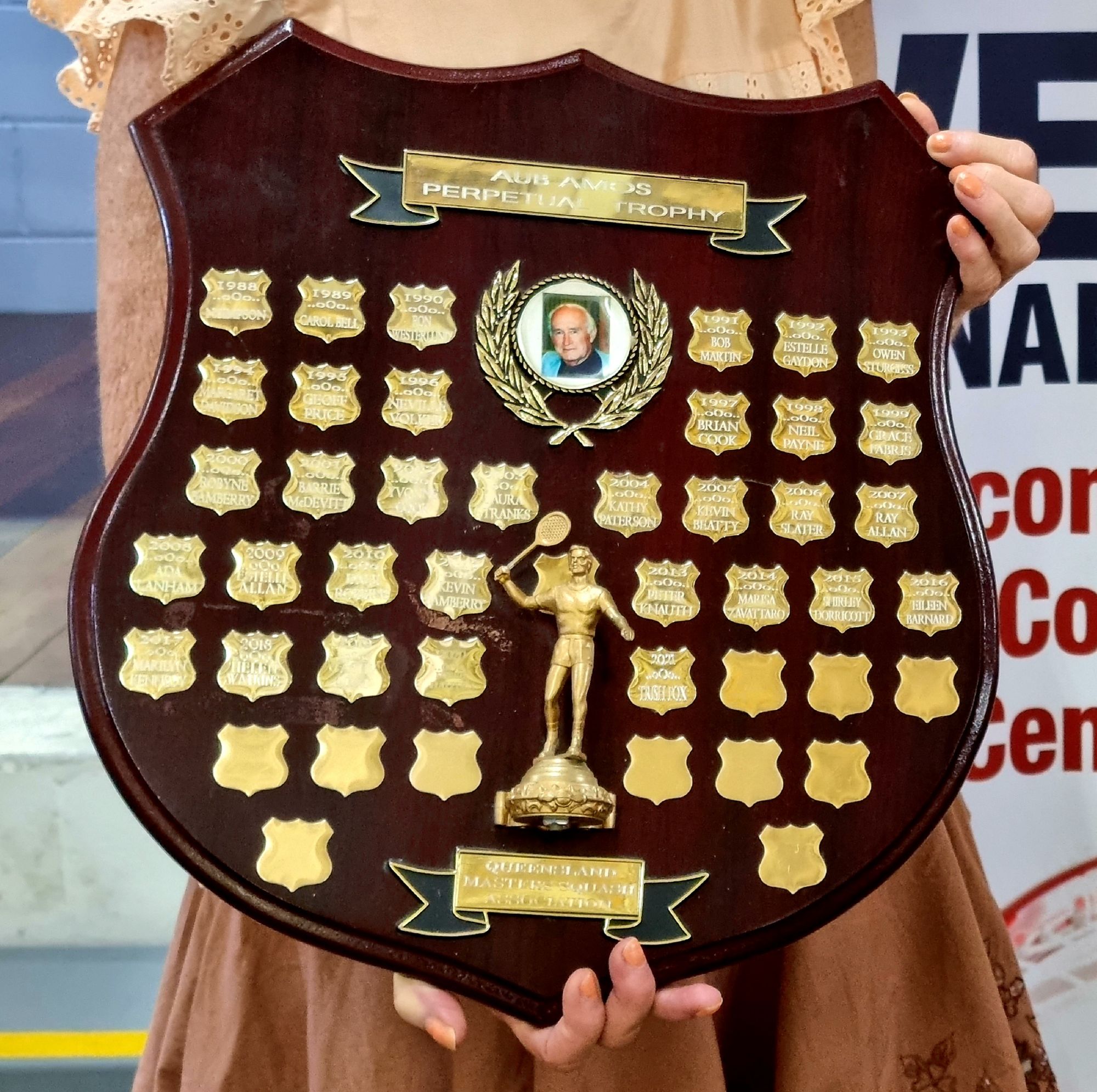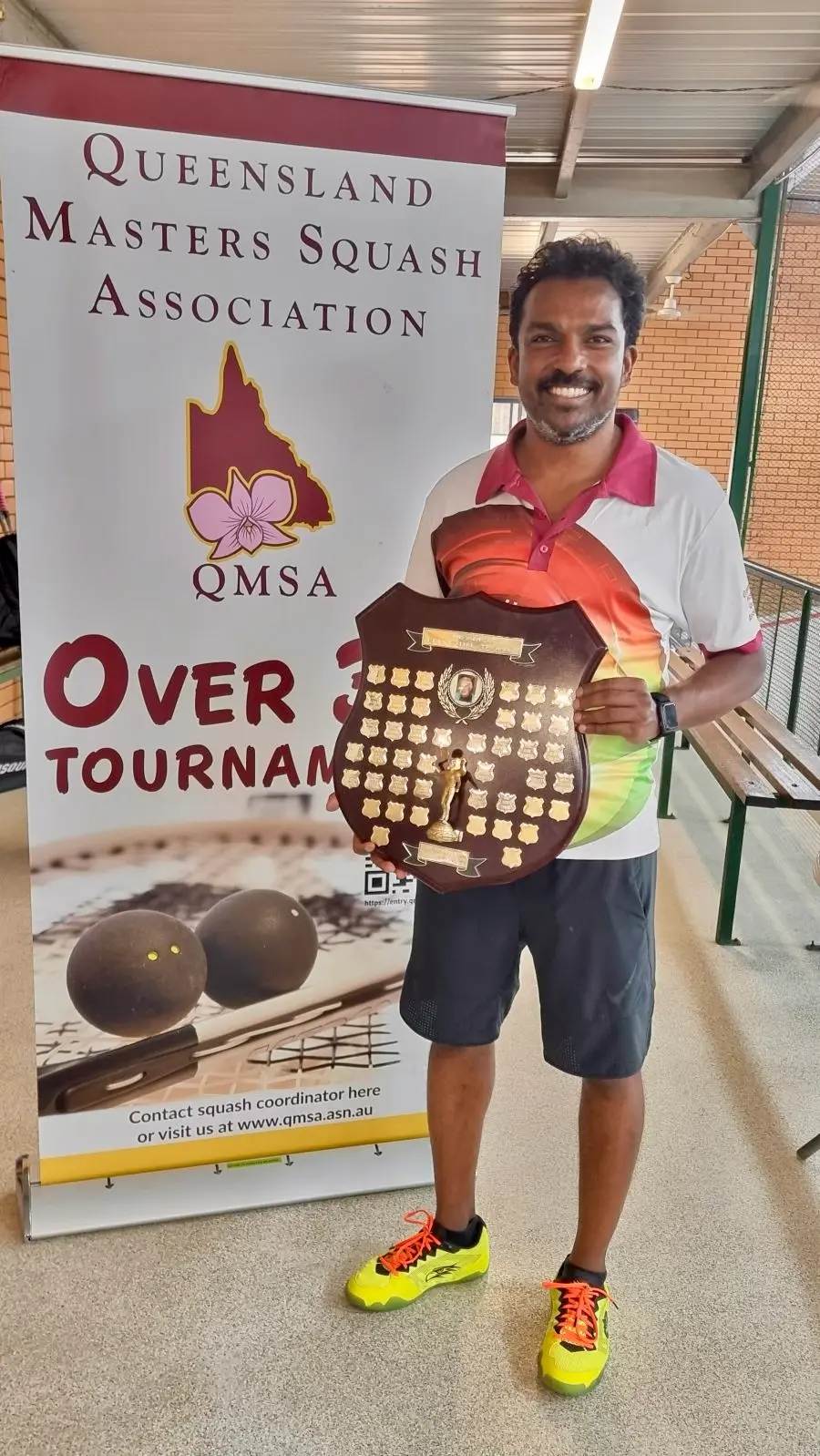Aub Amos Awards - 2023 winner announced
Aub Amos was one of the most famous and durable figures on the Australian squash scene. Aub’s name lives on through the annual QMSA award.

2023
Aub Amos Perpetual Trophy Winner
🏆 Werfel Thomas
Congratulations to Werfel Thomas for being this year's deserving recipient of the Aub Amos Award. Werfel has been on the QMSA committee and our webmaster for some years. He is responsible for our QMSA new website (Our Voice), online entry to our tournaments and assists all of us who are challenged with technology. Thank you Werfel.
- Helen Watkins

Aub Amos, one of the most famous and durable figures on the Australian squash scene died in Brisbane after an 18 month illness on 20th June 2005. A teetotaller and non-smoker, he was survived by his famous painter wife of 53 years, Dr Irene Amos, who in turn sadly passed away February 10th 2012. Aub’s name still lives on through the annual QMSA award to a member who offers:
- Services to Masters
- Willingness to serve on committees
- Input to running of QMSA
- Is a past or present long standing member
Irene’s brother in law Archie Lane recently contacted the QMSA to donate some items of Aub’s – among them his Australian Sports Medal awarded in 2000. This has since been framed by the QMSA and is currently on display at Sandgate Squash Club – home of many of Aub’s activities. A product of the Great Depression, Andrew Aubrey Percy Amos was born on a sugar cane farm near Proserpine, Queensland, and ventured to Brisbane as a young man to gain work at a foundry in James St, Fortitude Valley. The work was incredibly taxing, more than 100 hours a week for 12 shillings ($1.20) and a small bottle of milk for overtime. “They were so generous,” Amos often joked. “It was hard, but I loved it. We were filthy dirty all the time, the fumes and dust would make you sick but there was something exciting about the roaring furnaces and the molten metal.” He progressed from the back-breaking work of stoking furnaces to become manager, and eventually major shareholder of the successful foundry business. But the arduous work, difficult conditions and stress took its toll and Amos “retired” at 34. During his youth, he embraced sport. He was a black belt in judo, sailed many Brisbane to Gladstone and Sydney to Hobart yacht races on the ‘Laurabada’ and played top grade soccer and hockey. For recreation he played golf, tennis, roller skated and enjoyed ballroom dancing. After leaving the foundry, Aub decided to “go bush” and worked around Queensland as a dingo trapper, gold miner and professional fisherman, later claiming those years as some of the best of his life. “Fishing off the Capricorn coast, I lived on uninhabited islands, surviving on fish, turtles and crabs I caught,” he told Bernie Pramberg of The Courier Mail newspaper in an interview some years back. “It was a great life.” On a trip to Brisbane to visit friends, Amos stumbled upon a sport that was to change his life. “A mate suggested we have a game of squash and I knew so little about the game that I turned up to play barefoot,” he said. “That’s how it all started.” Within a year, he had given up all else for what he believed to be a “brilliant game”. At the age of 42, squash had become an obsession. He travelled around Australia seeking knowledge from famous coaches, and became a disciple of the great Egyptian professional Mohammed Dar Din. Dar Din told him that to gain respect as a coach, he first had to achieve something significant as a player. “People said I was too damn old to make it as a player, but I was fit, tough and could hit hard,” he said. At his first attempt, Amos won the Australian over-45 title, was runner-up at the British Championships and won in Ireland. He was a great opponent for Vic Hunt, father of the legendary Geoff Hunt, and was influential in the early coaching of successive generations of great Australian players. But he always regarded Dar Din as the best player he ever met. “And Heather McKay was the best woman – the best all-round athlete Australia has produced.” Amos travelled the world as a coach, always preaching the mantra of “strive to give your best and dig deep when things are not going well”. A stickler for discipline on and off the court, the wiry coach insisted his charges present themselves well at all time. “When I was Queensland state coach I’d travel around Queensland, living out of a suitcase for 30 days straight,” he told Pramberg. “Every day, I’d play and coach for 12 hours – I’d go through six or eight pairs of shoes and lose a stone-and-a-half (9kg) in weight on those trips. It was all about discipline.” Aub Amos was honoured for his services to the sport with a tribute dinner at Brisbane City Hall in 1994.
